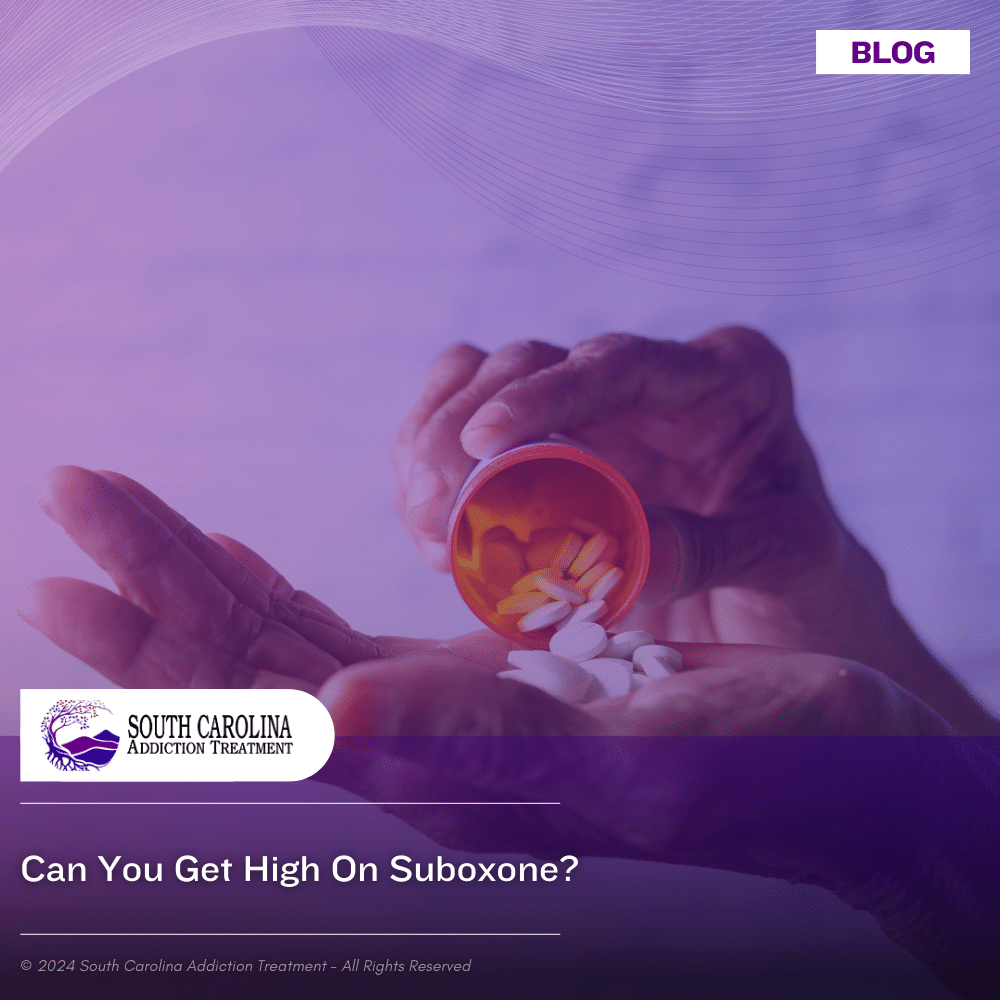Can You Get High on Suboxone?

Medically Verified: 2/1/24
Medical Reviewer
Chief Editor

All of the information on this page has been reviewed and verified by a certified addiction professional.
Opioid addiction is a serious problem in the United States. According to the Centers for Disease Control and Prevention (CDC), “Over 75% of the nearly 107,000 drug overdose deaths in 2021 involved an opioid.”[1]
Due to the risks involved in opioid addiction, experts created a more aggressive approach to treatment and recovery. Medication-assisted treatment (MAT) combines traditional addiction treatment methods with the use of FDA-approved medications to help soothe withdrawal symptoms and prevent cravings. As a result, clients are better able to focus on recovering instead of the physical symptoms that often make early recovery difficult.
One of the MAT medications commonly used to treat opioid use disorder is known as Suboxone. If you are thinking of trying Suboxone treatment, you might be wondering if it can get you high.
What is Suboxone?
Suboxone is a medication that is used to treat opioid use disorder by eliminating withdrawal symptoms, preventing cravings, and stopping the body from being able to get high on opioids.
Suboxone contains two active ingredients: buprenorphine and naloxone. Buprenorphine attaches to opioid receptors in the brain to prevent withdrawal symptoms and cravings.[2] On the other hand, naloxone blocks other opioids from affecting those receptors, preventing you from being able to get high or overdosing on opioid drugs.[3]
Suboxone is only given to patients who are recovering from an opioid use disorder and is dispensed by a licensed medical professional. As a result, it is not easy to abuse the medication.
What are the Benefits of Using Suboxone?
If you have an opioid use disorder that means your body is dependent on opioids. As a result, suddenly stopping their use will cause you to experience withdrawal symptoms. Oftentimes, the withdrawal symptoms and cravings people experience are difficult enough to end in a relapse.
When someone uses Suboxone, their withdrawal symptoms and cravings will be diminished. This helps them fully focus on other aspects of recovery, like individual therapy, group counseling, and relapse prevention planning. Suboxone can make early recovery a lot easier and more comfortable.
According to the Substance Abuse and Mental Health Services Administration (SAMHSA), MAT medications like Suboxone provide the following benefits:[4]
- Improved patient survival
- Increased retention in treatment
- Decreased illicit opiate use and other criminal activity among people with substance use disorders
- Increases patients’ ability to gain and maintain employment
- Improved birth outcomes among women who have substance use disorders and are pregnant
Does Suboxone Get You High?
If you are taking Suboxone in a medication-assisted treatment program, you will not experience a high. These programs ensure that Suboxone is not being abused by only dispensing one dose at a time. However, if you were to abuse large amounts of Suboxone at once, you could experience mind-altering effects.
People can get high on Suboxone if they buy it off of the street. Because Suboxone usually comes as a sublingual strip, individuals might dissolve them and then inject them to experience a high. While less common, Suboxone can come in tablet form, which is usually crushed and snorted if someone is abusing them.
If you begin taking Suboxone after having an opioid use disorder, you will not get high because you already have a tolerance for more potent opioids than Suboxone and buprenorphine has a ceiling effect, so after a certain dose, the effects stop being apparent. Additionally, people who attempt to abuse Suboxone with other opioids in their system might go into precipitated withdrawal, which can be extremely painful.
Signs of Suboxone Addiction
If you are worried that a loved one is abusing Suboxone, it is important to be aware of the signs of abuse. Typically, people suffering from a Suboxone addiction will exhibit similar signs as other types of opioid addictions.
The signs of Suboxone addiction include:
- Lying to friends and family and being secretive
- Social isolation
- Losing interest in previously enjoyed activities
- Going to multiple doctors to receive more than one prescription
- Stealing prescriptions from friends and family members
- Taking more than they are prescribed and running out early
- Pretending to lose prescriptions to get more
- Mixing Suboxone with other drugs to increase the effects
- Frequently appearing drowsy or sedated
- Bouts of nausea and vomiting
- Slowed breathing
- Impaired cognition
- Appearing high or intoxicated
While Suboxone is a lesser opioid than drugs like heroin or oxycodone, addiction still requires professional treatment. If you or a loved one are addicted to Suboxone, it’s time to seek professional help.
Find Help for Suboxone Abuse and Addiction
If you or a loved one suffers from Suboxone addiction, it’s time to seek help from a drug rehab program. Long-term abuse of Suboxone can cause devastating effects, making it vital that you receive the help you need.
To learn more about our Suboxone addiction treatment program, contact South Carolina Addiction Treatment Center today.
References:
- The Centers for Disease Control and Prevention (CDC): Understanding the Opioid Overdose Epidemic, Retrieved October 2023 From https://www.cdc.gov/opioids/basics/epidemic.html
- The Substance Abuse and Mental Health Services Administration (SAMHSA): What is Buprenorphine, Retrieved October 2023 From https://www.samhsa.gov/medications-substance-use-disorders/medications-counseling-related-conditions/buprenorphine
- The Substance Abuse and Mental Health Services Administration (SAMHSA): What is Naloxone, Retrieved October 2023 From https://www.samhsa.gov/medications-substance-use-disorders/medications-counseling-related-conditions/naloxone
- The Substance Abuse and Mental Health Services Administration (SAMHSA): Medications for Substance Use Disorders, Retrieved October 2023 From https://www.samhsa.gov/medications-substance-use-disorders

